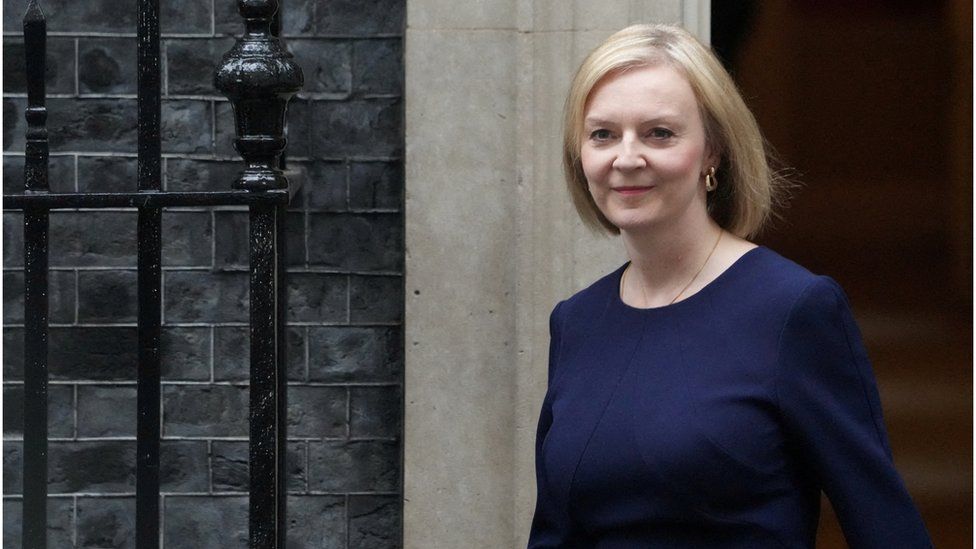ARTICLE AD BOX
 Image source, Reuters
Image source, Reuters
Prime Minister Liz Truss is resisting calls to bring forward publication of the independent spending watchdog's assessment of her tax plans.
The Treasury has confirmed the OBR's forecast will be released on 23 November, when the chancellor is due to set out further economic plans.
Some Conservative MPs have said this should come sooner to reassure financial markets.
The Treasury argues it should wait until additional changes are announced.
These "supply side" changes to stimulate growth are expected to include measures in eight areas - business regulation, agriculture, housing and planning, immigration, mobile and broadband, financial services, childcare, and energy.
Last week, Chancellor Kwasi Kwarteng set out some of the government's tax and spending plans - including a surprise announcement that it would scrap the 45% highest tax band for high earners.
However, his mini-budget was not accompanied by a forecast from the OBR (Office for Budget Responsibility), something which helped to fuel market turmoil.
In the days following the announcement, the pound slumped against the dollar and the Bank of England was forced to spend £65bn to protect pension funds.
After a meeting between Ms Truss, Mr Kwarteng and the OBR on Friday morning, the government confirmed the rest of its economic plans would be published on 23 November, alongside an OBR forecast.
The Treasury will receive the OBR's first draft on 7 October, but that won't be made public.
Some of Ms Truss's own MPs have raised concerns about the timetable.
Image source, PA Media
Image caption,Leading members of the Office of Budget Responsibility arriving at 10 Downing Street for a rare meeting with the prime minister
Waveney MP Peter Aldous said the timing of last Friday's plan had been "hopelessly wrong", and the rest of the details should be brought forward to October.
Sir Geoffrey Clifton-Brown said moving the date forward would give international markets and his constituents "reassurance".
And speaking to BBC Radio 4's World At One programme, Sir Charles Walker accused ministers of "naivety and hubris".
He said they had done "very little explaining" of their tax announcements and the markets had been "spooked".
Elsewhere Liberal Democrat leader Sir Ed Davey said the government, by waiting until 23 November, was allowing the UK economy to "fly blind" for two months.
"Families and businesses can't afford to wait any longer for this government to fix their botched, unfair budget," he said.
Former Conservative Chancellor George Osborne, who established the OBR, welcomed No 10's decision to confirm that its next financial statement would be accompanied by an OBR assessment.
"In the space of one week we've gone from the OBR being dismissed to the PM turning up to its meetings... turns out the credibility of the institution we created 12 years ago to bring honesty to the public finances is more enduring than that of its critics."
Speaking to BBC Breakfast, Treasury minister Andrew Griffith defended the government's decision not to publish an OBR forecast when it announced its initial tax and spend plans last Friday.
He said the government had a number of measures planned to grow the economy that had yet to be fully set out in detail, arguing there was a "wholly wrong perception this is not a fiscally responsible government".
The OBR confirmed on Thursday it had offered to provide a forecast for the mini-budget, but the chancellor had rejected that.
What is the Office for Budget Responsibility?
The Office for Budget Responsibility (OBR) is the independent watchdog for the government's finances.
It usually produces economic forecasts twice a year, to accompany each autumn budget and spring statement.
It scrutinises government plans, to increase taxes or borrowing for example, and predicts what the likely impact on the overall economy will be.
These forecasts are so important because a strong one gives investors confidence to put money into the UK economy - whereas a weak one is likely to have the opposite effect.
The government can request forecasts from the OBR at any time to get independent advice on big moves.
But it did not take the OBR up on its offer ahead of last week's mini-budget. This is thought to have undermined confidence in the markets.
This led to the pound dropping to its lowest rate against the dollar in 37 years on Monday, before returning to its previous level.
In recent days, the Conservatives have posted some of their worst opinion poll ratings in more than 20 years.
A poll published on Thursday by Survation put the party on 28%, more than 21 points behind Labour, while a separate survey by YouGov put the Tories on 21%, 33 points adrift.

 2 years ago
54
2 years ago
54








 English (US)
English (US)